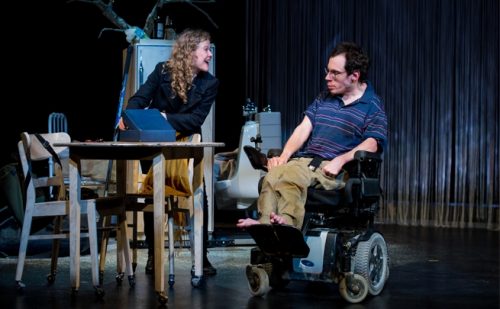Last Friday we saw Kill me now by Brad Fraser at the National Arts Centre in Ottawa. It’s a play about disability and despair. It’s intermittently funny, but it’s not a comedy.
The play focuses on Hank, a widower, and his son Joey, an adolescent with what appears to be cerebral palsy. Joey has a severe speech impediment and limited motor control. He’s played — brilliantly — by Myles Taylor, an actor with similar disabilities. The play is unsparing about what Joey can’t do and the problems this causes. Being a teenager is hard enough; imagine having to endure having your father help clean you after defecation.

Hank was once a successful novelist and he teaches at a college, but mostly now he cares for Joey. He’s trying to cope with the death of his wife, the loss of his career as a novelist, his obesity, his low income, and his likely future as an unpaid home health care worker. If only Hank’s future were that hopeful.
Hank discovers that he has an aggressive case of spinal stenosis, which undermines his motor control and, as he becomes dependent on pain medications, the clarity of his speech. He loses his mobility, his job, his ability to care for Joey, and finally control over his bowels. In return for this suffering, he receives the real but austere redemption of his family’s love, above all Joey’s. The conclusion of the play is about assisted suicide, hence the title. Go see it if you want to look over the abyss.*
A few thoughts. First, it remains the case that many in the able-bodied community have little understanding of the experience of those with disabilities. Not to mention the continued prevalence of crude bigotry.
One of the characters makes the familiar error of assuming that because Joey has trouble speaking, she needs to SPEAK LOUDLY AND SLOWLY to him. It’s easy to laugh, but Myles Taylor’s performance made me aware that I too held hidden false assumptions. On the one hand, I unconsciously infer that a person who is struggling to speak may be struggling to think. (Even after Stephen Hawking!) Similarly, some people with neurological disorders have limited fine motor control over their facial muscles. This limits their ability to display affect. It’s a mistake, however, to infer that blunted facial affect implies that the person lacks a complex emotional life.
Second, Kill Me Now is graphic about the physical challenges of disability: eating, dressing, walking, and bathing. Providing this care requires many hours of physically demanding labour. Most families cannot afford extensive in-home help. There is no question that many people receiving disability support are much less impaired than Hank or Joey. Nevertheless, advocates for policies that would reduce Medicaid or Social Security disability benefits need to be mindful that they may be putting families like Hank’s in great peril.
Finally, part of what makes fiction and live theatre so powerful is that they draw me into the inner life of a character. The characters in Kill Me Now are greatly burdened by their identification as disabled. They understand themselves that way because meaning is social, and that is how we understand them. This is an unintended cruelty. We also have to understand disabled people in terms of their strengths and our common humanity. It’s not that you can change the facts of disability by simply using different words, but you can sometimes help people to live lives that are defined by their strengths.
It’s not, by the way, just disabled people who are pre-occupied by their social labelling. I have spent far too much time polishing the insignia of my credentials and (what I imagine are) my strengths and accomplishments. Perhaps you have too. We’d all do better if we could lay those burdens down.
*Gerard Manley Hopkins (from No worst, there is none):
O the mind, mind has mountains; cliffs of fall
Frightful, sheer, no-man-fathomed. Hold them cheap
May who ne’er hung there. Nor does long our small
Durance deal with that steep or deep. Here! creep,
Wretch, under a comfort serves in a whirlwind: all
Life death does end and each day dies with sleep.

